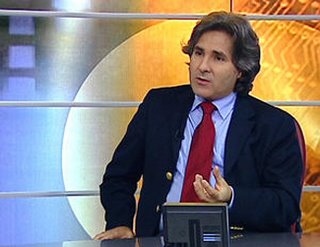First They Came for the Jews
First they came for the Jews
and I did not speak out because I was not a Jew.
Then they came for the Communists
and I did not speak out because I was not a Communist.
Then they came for the trade unionists
and I did not speak outbecause I was not a trade unionist.
Then they came for me
and there was no one left to speak out for me.
(Poem attributed to) Pastor Martin Niemöller
WHAT I BELIEVE IN (BUSINESS CARD PREFACE)
I came to Iran, graciously invited by the Ministry of Foreign Affairs of the Islamic Republic, to research and do some fact finding about the country, its life and institutions, perceptions and reality. As this conclave coincided with my coming, I intended first to be present here only as a silent witness, to report back what I saw and what I heard.
First they came for the Jews
and I did not speak out because I was not a Jew.
Then they came for the Communists
and I did not speak out because I was not a Communist.
Then they came for the trade unionists
and I did not speak outbecause I was not a trade unionist.
Then they came for me
and there was no one left to speak out for me.
(Poem attributed to) Pastor Martin Niemöller
WHAT I BELIEVE IN (BUSINESS CARD PREFACE)
I came to Iran, graciously invited by the Ministry of Foreign Affairs of the Islamic Republic, to research and do some fact finding about the country, its life and institutions, perceptions and reality. As this conclave coincided with my coming, I intended first to be present here only as a silent witness, to report back what I saw and what I heard.
But controversies about the real significance of these proceedings made me feel I had the moral duty to say some words, and concoct this text.
It is not by any means systematic and scientific, but rather impressionistic. I hope it is, at least, clear in its message.
First of all, a personal introduction, or, as Louis Pauwels used to say, something about "the things I believe in" (ce que je crois).
I come from Portugal, in the outmost Western part of Europe, where land ends and the ocean starts.
I come from Portugal, where in the very early Middle Ages there was a sort of Golden Era of coexistence of Muslims (mostly from Northern Africa) and other faiths. It was the time of Princes who were scholars and poets. It was the time of Almutamid (1040-1095), of the Al Andalus Emirate and successor taifa governorates (711-1492), of an Edenic Age of "Dialogue of Civilisations" (to pick on the theme of a very recent and very welcome initiative from the governments of Spain and Turkey) (*).
I come from post – authoritarian Portugal (if labels suit), born in a generation used to militancy (in my political quarters) for what we called "revolutionary nationalism".
In late high school and university, our principal foes were "capitalist internationalism", all forms of "imperialism", and specially the then expansive soviet system and its "puppets". From my ideological family tree perspective, we were also fighting (or believing in that fight) "the triumphant demo-liberal thinking" in the west, and all forms of racism, in particular the ones coming from "supremacist" soldiers, from all colours, quarters and languages.
Among the most sinister antics, "Nazism" (to use the Anglo - Saxon derogatory terminology) appeared to us as repulsive as the other Hegelian illegitimate son, "pseudo – Bolshevik" (as the extreme left would later say) Stalinism.
Hitler and his Twilight of the Gods entered the dark side of pop culture, and generated despise or rage, from almost all sides of the political spectrum. Stalinism has been less present as a spectre, and we could even argue that it was forgotten in many areas of Europe, specially the ones that suffered under its weight. This makes more urgent the preview of the forthcoming movie version of Solzhenitsyn’s "First Circle". Memory should be a two way road, although we know it is largely selective, and there are even usages for amnesia (1).
Maybe all this is not immensely controversial.
But I also believe in a couple of things about current international affairs. These could be more debatable for this conclave.
I believe, for example, that Iran, with its ancient and wise civilisation, that precedes even the wonders of the Hellenic world, should not be treated by certain international circles as a primitive clan, born yesterday, with no rights except to obey some politically correct master.
I believe that Iran should still seek reparation, for being the sole case of a nation unjustly attacked with weapons of mass destruction, in this case chemical and maybe bacteriological weapons.
I believe that the Palestinian nation should have an independent, viable, internationally recognised state, with external borders and all the attributes of a sovereign body, including armed forces and police.
I believe that the international intervention in Afghanistan was righteous and measured, as the country showed no will to extradite or suppress the public perpetrators of 9/11.
I believe the last international intervention in Iraq could only be justified under an international specific resolution from the UNSC, and only in case there was a proven system of WMD, ready to be used.
Maybe many in this room are still with me in this.
But I also believe in the right of Israel to exist as a sovereign state, capable of protecting its own people, and live in peace with its neighbours.
If this was (and is) possible with Jordan and Egypt, why not with others?
If Ytzhak Rabin and Yaser Arafat, men of war turned into men of peace, managed to plan this, why not others?
Maybe some are still not entirely in disagreement.
Finally, I believe that it would be good for everyone if Iran and the US would establish full diplomatic relations, based on the principles of non interference, equality of status, respect for national sovereignty and compliance with international law.
I hope someone in this room agrees.
ON BARBARIANS
Holokauston, or what is totally burn (from "holos" and "kaustos"), originally meant a offering to the pagan gods. "Holocaust" and "Barbarianism" come together.
"Barbarian" is not used here as an updated Hellenic notion of "strangers to our civilisation", but as actors of inhumanity, in a grand scale.
The first image that pops into our mind is Ernst Jüngers Head Forester (Öberfoster), in "On the Marble Cliffs", published in 1939, as a dreamlike/nightmarish prelude to the European storm of fire (2).
The Forester is a sort of slaughterhouse manager, leading a warlike tribe to destroy next door’s ancient, enlightened, civilisation. It is at least tempting to see Iran’s imprisoned neighbour, and former chemical enemy, Saddam Hussein, as another evident application of this bloody tyrannical archetype.
The Hitlerian system (to simplify, and refer to the post-1933 "experiment") was, from my perspective, a form of ethnic (or ethnically presumed) imperialism, barbarian totalitarianism, "demonic parody of religion" - to use the most adequate formula of Pol Vandromme (3) - and well behaved proletarian dictatorship. It was even more tragic as it disguised itself as social revolution, a transvestite courageously denounced by the likes of Ernst Niekisch, the aforementioned Jünger, Hannah Arendt and many others.
Of course that, for a certain politically correct Left (that used to say that "Church is Fascism"), it is always disturbing to find that, among the ones that (from very early) raised their voices against this menacing beast, was D. Manuel Gonçalves Cerejeira (1888-1977), a Portuguese Theologian and Historian, who would later become the Patriarch Cardinal of Lisbon , under Salazar. He wrote against Nazism not in the comfort of post-war "democracy triumph", but in the uncertain darkness of the early thirties of last century.
The Martin Niemöller much quoted poem, that appeared in many versions, also shows how dignified people from all backgrounds, faiths and creeds, finished to realise what kind of monster was being bred by the Third Reich.
HOLOCAUST(S)
Being a Portuguese Catholic, an ex (future?) - "revolutionary nationalist", a man with a rib that is conservative, another one anarchist, a third trade unionist, a supplementary libertarian one, and a final one that we could call "justicialist" (hoping it makes sense outside of Argentina), and, last but not the least, a sceptic in earthly matters, I have inscribed in my political Holy Book (to the death) the fight against anti-Semitism, be it under the anti-Jewish guise or Anti-Arabic one. And also the fight – also until death – against anti-white racism in Africa, anti-black racism in the west, anti-Japanese and anti-Chinese prejudice, etc.
I also believe that memory (Niskor, as I believe they say in Hebrew), oral history, sound historiography and non forged documents, confirm the existence of a Holocaust. But this one has, for me, a vaster and deeper sense than the "industry" created around its perception, so well denounced by Norman Finkelstein (a Jewish name that is not popular, to say the least, in several Zionist circles).
We had, in 20th century Europe and the world at large, between the end of the 30’s (we could argue between the end of the First World War) and the end of the 40’s, several coordinated strategies for the physical elimination of social groups, communities, people, nations and whole cultures. This planned and systematic destruction (sometimes fanned from the bottom, sometimes promoted from the top), that had Hitler and Stalin as main heralds and workers, finds Jews not as the single victimised group, but one of the most suffering.
This is important. Europe had a Jewish population that was wiped out, and there was a systematic intent to do so. Meticulous planning and meticulous action provoked a bigger than life (and bigger than death) tragedy, that still has wounds open, as all can see in the sinister remnants of the past, be it in Auschwitz or Bergen Belsen, in Dachau or Treblinka.
How can someone believe that all European Union members, all its governments and heads of state, parliamentarians and major opinion makers, are all involved in a major conspiracy to "invent" the Holocaust?
How can someone believe that the European Union, that has a traditional policy of understanding all parts in the Middle East problem, is actively promoting some kind of strategy to stress crimes against Jews, and ignore historical crimes against Arabs, Christians and other faiths?
As I stated before, the policy of extermination dictated by Hitlerism is well documented, and it would be fastidious to repeat the vast amount of historical findings on this. Proving intent and systematisation is the key: there was a plan to wipe out internal enemies of the Reich. We can debate about perceptions (were Jews singled out for being "anti-patriotic", "explorers", "immoral", "alien", "non Arian", fifth columnists, etc?), but there is not much to be added about the existence of the basic plan for extinction.
From there on, numbers and statistics cease to make existential sense (this is different from saying that studies on the matters should not be, by definition, free in free societies), and I see no use in discussions about burning furnaces head count orthodoxy. The first one to signal this was not a deep philosopher, but Woody Allen (4).
To say that there were several holocausts, or catastrophic genocides, where entire peoples were singled for extinction, cannot mean the trivialisation of each of those. It should only mean, if you are in good faith, that there are not "good" and "bad" genocides, or more palatable ones than others.
On the other hand, the word "holocaust" as been used as metaphor for human extinction, through other causes than a systematic desire to kill people (5).
We should then always explain when we speak in a literary way, and when we talk about factual organised campaigns to wage war against the idea of humanity itself.
JUSTA LEX
Are there sufficient laws in place, internationally (and without getting into the interminable discussion on the applicability of public international law), to punish acts of holocaust, meaning attempts to wipe out an entire people, nation, civilisation, etc.?
The UN Convention on Genocide, discussed and approved between 1948 and 1951, seemed an excellent instrument. It criminalised not only direct mass murder, but also deportation, or forms of persistent or systematic persecution. Some argue there are flaws in the basic norm, as it doesn’t specifically integrate, for example, economic genocide, or man induced environmental catastrophes, leading to genocide. It is comprehensive enough, though, to protect national, ethnic, racial and religious groups, from a large catalogue of intentional acts, whatever the true motivation is (5a).
In fact, the so called "Holodomor", the "Great Famine" in Ukraine, in the thirties of last century, where millions died of starvation, maybe would not count under "genocide", as it was not direct mass execution, but it derived from politically designed forced collectivisation, relocation and deportation of producers and farmers, and the simultaneously destruction of national intelligentsia, in order to tame what was perceived as latent "irredentism", and Germanophily.
As for terrorism, some argue that "genocide" (a term coined by a Jewish lawyer, after WWII) has to do with intent, or motivation.
Extended killings by a crime syndicate are not "terrorism", although they could produce more devastating results than "terrorist acts". These ones have to be directed against civilians and non combatants, and to have some sort of political motive, or politically argued motive.
In the same line, mass murder that results from sporadic clashes, or involves mere land or tribal disputes, could be seen by many as something else than "genocide", as the master plan , or the initial execution blueprint, may be lacking, although results could be as inhumane and widespread as "pure legal" genocide.
We could also argue that Hague and Geneva conventions, forbidding cruel forms of weaponry, securing the protection of civilians, neutrals, non combatants, protecting prisoners of war and instituting the bases of the so called "humanitarian law of war", have direct impact in the minimising or prosecution of at least "indirect" forms of genocide.
But the truth is that genocide, "direct" or "indirect", was committed, according to most accounts, in many occasions after the Convention was fully implemented and accepted.
Cases
Summary
Ukraine, 1932-1933
4,821,600 died in the "Great Hunger" engineered by Stalin 1932-33. 7,465,000 died in 1932-1939.
USSR 1934 to 1953
From 1934 to 1953, up to 15 million Russians disappered in the GULAGS.
Germany/Poland 1939-1945
5,000,000 non-jews died in German camps
Germany, 1942-1945
5,860 mill. jews died in German KZ-Camps
Poland/Russia from 1941
1,700,000 Polish people were deported to Siberia after 1941.
Bengal, 1943
1,500,000 died of war-related famine in 1943 in Bengal.
Germany, East Prussia 1945
3,000,000 German civilians were killed by Russians in the last months of WW2.
Cambodia, 1975-1979
Khmer Rouge´s (president 1976) killed about 1,700,000
East Timor 1983-1985
200,000 East Timorese (Portugal)I were killed in 1983-1985, by Indonesian invading forces
Rwanda/Burundi - 1993-1994
700,000 Hutus and Tutsies killed in Rwanda, in internecine war
Yugoslavia 1991-2000
At least 250,000 dead in ex-Yugoslavia (until 2000), mostly Bosnian Muslims and Catholic Croats
And the wars that succeeded the conflict that ended in 1945 were especially predatory and left immense wounds, with some seeing the use of practices forbidden by the humanitarian law once dreamt by the Russian Tsar, at the end of the 19th Century.
(Some) War deaths in the post- WW2 experience:
Korea 3,000,000
Vietnam 2,059,000
Nigeria/Biafra 2,000,000
Afghanistan 1,300,000
Some calculations indicated also that around 170 million people died under totalitarian regimes during the XX Century.
No wonder, than, that in April 2006, ex- Czech President Vaclav Havel addressed the Council of Europe, on the need not to forget mass extermination, deportation, expulsion, deportation. He added that the distinction between "good" and "bad" concentration camps is a dangerous one, and observed that crimes against humanity, by definition, have as main victim the whole of mankind, through the suffering of its members.
There should be, so , sufficient norms, courts and law enforcement agencies, together with preventive bodies, capable of early warning, deterrence , punishment and reparation for genocide, or holocaust (5b) .
TRICKS OF MEMORY
Part of this mechanism of genocide prevention should be based on experience, and memory. But memory plays us tricks, and is sometimes a force for destruction. This is why certain Greek City-States would forbid the remembrance of sad events (as the French put it, ne parlons pas de malheur). But certain nations – we immediately recall Serbia – precisely celebrate their national days to commemorate sad, even tragic, or catastrophic events, as was the battle of Kosovo Polje, where most of the elite was destroyed in a single burst.
How to deal with this suffering, though?
The Russian psychologist Aleksandr Luria may have given us a way, in two brilliant, puzzling books (6). He treated Zazetsky, a survivor of the battle of Smolensk, who had a terrible brain wound. This affected his memory radically. In a sense, the veteran would not recall a thing, although he would be capable of most intellectual and physiological acts. Doctors would teach him how to eat soup with a spoon, for example, and he would do it on the spot, but he would forget it some time after. The same with everything else he would try, or do. He would not recall his name, his past, his family, his friends, his city, his country.
In a sense, Zazetsky was the true creator, doing everything ex novo. But the absence of historical references deprived him of a minimally normal, decent and comfortable life.
The other Luria patient was "S", the "Mnemonist". He was not able to forget.
His absolute memory was intense, and if he wanted to suppress cruel or sad elements of his past life, he would fail. Happiness and pain would live forever in his mind, as memories would always be present, with the same intensity.
His life became impossible, because of too much memory, as the life of Zazetsky became unbearable, because of no memory.
There should be a way for persons, and people, to find a middle ground between the Mnemonist and the Man from Smolensk. Between no memory, that will make us repeat the errors of the past, and too much memory, that will make us unable to relax, forgive and forget the bad things, we should find a way. An healthy way.
TO THINK
Almost as imbecilic as denying XX Century holocausts, starting with the extermination of Jewish Europeans, is to - in peace time and without the constraint of a state of emergency (of what the Germans call Notstandrecht) - want to approve (or conserve, or converse) laws that will forbid any scientific and intellectual discussion on the same subjects.
If the a priori negation of the whole can look sectarian, the refusal to revise the parts also contradicts the principles, rules, assumptions, bases and fundaments of systematic thought.
We should distinguish, though, between honest discussion of issues, in an intellectual level (and even taking into account that political analysts can contaminate the politics they discuss, in a sort of application of the Heisenberg principle), and the advancement of an agenda, disguised as scientific discussion.
We sometimes feel that many who deny the existence of proven holocaust or genocides, would themselves be able to commit these acts, if the circumstances were right, and if they had the power to do so. This is why the absence of laws against intellectual discussion should be complemented with presence of laws against the promotion of violence, racial hatred, or the incitement to murder, and mass murder.
We sometimes also feel that professional "negationists", using the excuse of the discussion of details, finish denying the whole that was proven correct. It would be as if bad calculations about the size, matter or distance from earth, would lead people to doubt about the existence of the sun.
We sometimes feel that, for each "holocaust industry", there is a "holocaust denial industry".
We sometimes feel that human groups and nations didn’t yet grow enough to stop asking history for scapegoats (as Nietzsche once said).
But as we said before, there should be no bounds to intellectual discussion, and intellectuals should not be surprised if their more controversial ideas would be debated, contested, opposed and destroyed, or proved wrong. This is a never ending process of acquisition, growing and learning.
This is why, together with marginal "negationists", usually accused by the mainstream of lesser talent than demagoguery, we have, or had, important intellectual figures who are not afraid of dwelling in the past, with open minds and hearts, and learning each day new available data, facts, interpretations, putting them to the litmus test of discussion, etc.
We could mention, among those figures, and starting in Israel and Palestine, but also in the US and Europe, Hannah Arendt or Leo Strauss, Amos Oz, Zeev Sternhell, Paul Eisen, Eduard Said, Paul McCormick, Wolfgang Mommsen and Ernst Nolte.
Each in its own way, they all dared to look at the past with an open mind, based not on faith, but doubt. Not based on love for prejudice, but love for truth. Not based on love for dogma, but on the desire to know and understand more.
To know always more,
to understand always better.
NOTES
(*) Cf. , for the Spanish "utopian" dimension of Al Andalus, M. R. Menocal, Ornament of the World : How Muslims, Jews and Christians created a culture of tolerance in Medieval Spain, Back Bay Books 2002, and S. E.Al-Dzajairi, The Hidden debt to Islamic Civilisation, Bayt al Hikma Press 2005.
(1) See, for example, Y. Yerushalmi et al., Usages de l’oubli, Ed. Du Seuil 1988.
(2) See Jüngers "de-crypting" of his book, in the conversation with Julien Hervier, The details of time: conversations with Ernst Jünger, Marsilio Pub. 1995.
(3) P. Vandromme, L’Europe en Chemise, Ed. de La Francité, 1971
(4) For example, in Deconstructing Harry, 1997. His quip about Auschwitz (that was meant as an attack against the insensitivity of people that like to count dead heads), was attacked severelly by Elliott Gertel, in Over the Top Judaism : Precedents and Trends in the Depiction of Jewish Beliefs and Observances in Film and Television(Univ.Press of America).
(5) A good example of "metaphorianism" is D. Wilson, Five Holocausts, Steele Roberts Pub. 2001. According to the author, militarism, oppression, economic destitution, population explosion and environmental destruction will seal our fate as a dying species.
(5b) This is the background for Koffi Annan’s decision to appoint a UN Special Advisor for the Prevention of Genocide (and a pre-emptive Plan of Action), back in 2004, on a speech remembering the 10th anniversary of the bloodbath that killed 800.000 people in Rwanda.
(5a) The crime of genocide is defined in international law in the Convention on the Prevention and Punishment of Genocide. Relevant passages:
"Article II: In the present Convention, genocide means any of the following acts committed with intent to destroy, in whole or in part, a national, ethnical, racial or religious group, as such:
(a) Killing members of the group; (b) Causing serious bodily or mental harm to members of the group; (c) Deliberately inflicting on the group conditions of life calculated to bring about its physical destruction in whole or in part; (d) Imposing measures intended to prevent births within the group; (e) Forcibly transferring children of the group to another group.
Article III: The following acts shall be punishable:
(a) Genocide;
(b) Conspiracy to commit genocide;
(c) Direct and public incitement to commit genocide;
(d) Attempt to commit genocide;
(e) Complicity in genocide.
The Genocide Convention was adopted by the United Nations General Assembly on 9 December 1948. The Convention entered into force on 12 January 1951. More than 130 nations have ratified the Genocide Convention and over 70 nations have made provisions for the punishment of genocide in domestic criminal law. The text of Article II of the Genocide Convention was included as a crime in Article 6 of the 1998 Rome Statute of the International Criminal Court.
(6) A. R. Luria, The Man with a shattered world: The History of a Brain Wound, Harvard Univ. Press, 2004 reprint, and The Mind of a Mnemonist: A Little Book about a vast memory, HUP, reprint 2006.
First of all, a personal introduction, or, as Louis Pauwels used to say, something about "the things I believe in" (ce que je crois).
I come from Portugal, in the outmost Western part of Europe, where land ends and the ocean starts.
I come from Portugal, where in the very early Middle Ages there was a sort of Golden Era of coexistence of Muslims (mostly from Northern Africa) and other faiths. It was the time of Princes who were scholars and poets. It was the time of Almutamid (1040-1095), of the Al Andalus Emirate and successor taifa governorates (711-1492), of an Edenic Age of "Dialogue of Civilisations" (to pick on the theme of a very recent and very welcome initiative from the governments of Spain and Turkey) (*).
I come from post – authoritarian Portugal (if labels suit), born in a generation used to militancy (in my political quarters) for what we called "revolutionary nationalism".
In late high school and university, our principal foes were "capitalist internationalism", all forms of "imperialism", and specially the then expansive soviet system and its "puppets". From my ideological family tree perspective, we were also fighting (or believing in that fight) "the triumphant demo-liberal thinking" in the west, and all forms of racism, in particular the ones coming from "supremacist" soldiers, from all colours, quarters and languages.
Among the most sinister antics, "Nazism" (to use the Anglo - Saxon derogatory terminology) appeared to us as repulsive as the other Hegelian illegitimate son, "pseudo – Bolshevik" (as the extreme left would later say) Stalinism.
Hitler and his Twilight of the Gods entered the dark side of pop culture, and generated despise or rage, from almost all sides of the political spectrum. Stalinism has been less present as a spectre, and we could even argue that it was forgotten in many areas of Europe, specially the ones that suffered under its weight. This makes more urgent the preview of the forthcoming movie version of Solzhenitsyn’s "First Circle". Memory should be a two way road, although we know it is largely selective, and there are even usages for amnesia (1).
Maybe all this is not immensely controversial.
But I also believe in a couple of things about current international affairs. These could be more debatable for this conclave.
I believe, for example, that Iran, with its ancient and wise civilisation, that precedes even the wonders of the Hellenic world, should not be treated by certain international circles as a primitive clan, born yesterday, with no rights except to obey some politically correct master.
I believe that Iran should still seek reparation, for being the sole case of a nation unjustly attacked with weapons of mass destruction, in this case chemical and maybe bacteriological weapons.
I believe that the Palestinian nation should have an independent, viable, internationally recognised state, with external borders and all the attributes of a sovereign body, including armed forces and police.
I believe that the international intervention in Afghanistan was righteous and measured, as the country showed no will to extradite or suppress the public perpetrators of 9/11.
I believe the last international intervention in Iraq could only be justified under an international specific resolution from the UNSC, and only in case there was a proven system of WMD, ready to be used.
Maybe many in this room are still with me in this.
But I also believe in the right of Israel to exist as a sovereign state, capable of protecting its own people, and live in peace with its neighbours.
If this was (and is) possible with Jordan and Egypt, why not with others?
If Ytzhak Rabin and Yaser Arafat, men of war turned into men of peace, managed to plan this, why not others?
Maybe some are still not entirely in disagreement.
Finally, I believe that it would be good for everyone if Iran and the US would establish full diplomatic relations, based on the principles of non interference, equality of status, respect for national sovereignty and compliance with international law.
I hope someone in this room agrees.
ON BARBARIANS
Holokauston, or what is totally burn (from "holos" and "kaustos"), originally meant a offering to the pagan gods. "Holocaust" and "Barbarianism" come together.
"Barbarian" is not used here as an updated Hellenic notion of "strangers to our civilisation", but as actors of inhumanity, in a grand scale.
The first image that pops into our mind is Ernst Jüngers Head Forester (Öberfoster), in "On the Marble Cliffs", published in 1939, as a dreamlike/nightmarish prelude to the European storm of fire (2).
The Forester is a sort of slaughterhouse manager, leading a warlike tribe to destroy next door’s ancient, enlightened, civilisation. It is at least tempting to see Iran’s imprisoned neighbour, and former chemical enemy, Saddam Hussein, as another evident application of this bloody tyrannical archetype.
The Hitlerian system (to simplify, and refer to the post-1933 "experiment") was, from my perspective, a form of ethnic (or ethnically presumed) imperialism, barbarian totalitarianism, "demonic parody of religion" - to use the most adequate formula of Pol Vandromme (3) - and well behaved proletarian dictatorship. It was even more tragic as it disguised itself as social revolution, a transvestite courageously denounced by the likes of Ernst Niekisch, the aforementioned Jünger, Hannah Arendt and many others.
Of course that, for a certain politically correct Left (that used to say that "Church is Fascism"), it is always disturbing to find that, among the ones that (from very early) raised their voices against this menacing beast, was D. Manuel Gonçalves Cerejeira (1888-1977), a Portuguese Theologian and Historian, who would later become the Patriarch Cardinal of Lisbon , under Salazar. He wrote against Nazism not in the comfort of post-war "democracy triumph", but in the uncertain darkness of the early thirties of last century.
The Martin Niemöller much quoted poem, that appeared in many versions, also shows how dignified people from all backgrounds, faiths and creeds, finished to realise what kind of monster was being bred by the Third Reich.
HOLOCAUST(S)
Being a Portuguese Catholic, an ex (future?) - "revolutionary nationalist", a man with a rib that is conservative, another one anarchist, a third trade unionist, a supplementary libertarian one, and a final one that we could call "justicialist" (hoping it makes sense outside of Argentina), and, last but not the least, a sceptic in earthly matters, I have inscribed in my political Holy Book (to the death) the fight against anti-Semitism, be it under the anti-Jewish guise or Anti-Arabic one. And also the fight – also until death – against anti-white racism in Africa, anti-black racism in the west, anti-Japanese and anti-Chinese prejudice, etc.
I also believe that memory (Niskor, as I believe they say in Hebrew), oral history, sound historiography and non forged documents, confirm the existence of a Holocaust. But this one has, for me, a vaster and deeper sense than the "industry" created around its perception, so well denounced by Norman Finkelstein (a Jewish name that is not popular, to say the least, in several Zionist circles).
We had, in 20th century Europe and the world at large, between the end of the 30’s (we could argue between the end of the First World War) and the end of the 40’s, several coordinated strategies for the physical elimination of social groups, communities, people, nations and whole cultures. This planned and systematic destruction (sometimes fanned from the bottom, sometimes promoted from the top), that had Hitler and Stalin as main heralds and workers, finds Jews not as the single victimised group, but one of the most suffering.
This is important. Europe had a Jewish population that was wiped out, and there was a systematic intent to do so. Meticulous planning and meticulous action provoked a bigger than life (and bigger than death) tragedy, that still has wounds open, as all can see in the sinister remnants of the past, be it in Auschwitz or Bergen Belsen, in Dachau or Treblinka.
How can someone believe that all European Union members, all its governments and heads of state, parliamentarians and major opinion makers, are all involved in a major conspiracy to "invent" the Holocaust?
How can someone believe that the European Union, that has a traditional policy of understanding all parts in the Middle East problem, is actively promoting some kind of strategy to stress crimes against Jews, and ignore historical crimes against Arabs, Christians and other faiths?
As I stated before, the policy of extermination dictated by Hitlerism is well documented, and it would be fastidious to repeat the vast amount of historical findings on this. Proving intent and systematisation is the key: there was a plan to wipe out internal enemies of the Reich. We can debate about perceptions (were Jews singled out for being "anti-patriotic", "explorers", "immoral", "alien", "non Arian", fifth columnists, etc?), but there is not much to be added about the existence of the basic plan for extinction.
From there on, numbers and statistics cease to make existential sense (this is different from saying that studies on the matters should not be, by definition, free in free societies), and I see no use in discussions about burning furnaces head count orthodoxy. The first one to signal this was not a deep philosopher, but Woody Allen (4).
To say that there were several holocausts, or catastrophic genocides, where entire peoples were singled for extinction, cannot mean the trivialisation of each of those. It should only mean, if you are in good faith, that there are not "good" and "bad" genocides, or more palatable ones than others.
On the other hand, the word "holocaust" as been used as metaphor for human extinction, through other causes than a systematic desire to kill people (5).
We should then always explain when we speak in a literary way, and when we talk about factual organised campaigns to wage war against the idea of humanity itself.
JUSTA LEX
Are there sufficient laws in place, internationally (and without getting into the interminable discussion on the applicability of public international law), to punish acts of holocaust, meaning attempts to wipe out an entire people, nation, civilisation, etc.?
The UN Convention on Genocide, discussed and approved between 1948 and 1951, seemed an excellent instrument. It criminalised not only direct mass murder, but also deportation, or forms of persistent or systematic persecution. Some argue there are flaws in the basic norm, as it doesn’t specifically integrate, for example, economic genocide, or man induced environmental catastrophes, leading to genocide. It is comprehensive enough, though, to protect national, ethnic, racial and religious groups, from a large catalogue of intentional acts, whatever the true motivation is (5a).
In fact, the so called "Holodomor", the "Great Famine" in Ukraine, in the thirties of last century, where millions died of starvation, maybe would not count under "genocide", as it was not direct mass execution, but it derived from politically designed forced collectivisation, relocation and deportation of producers and farmers, and the simultaneously destruction of national intelligentsia, in order to tame what was perceived as latent "irredentism", and Germanophily.
As for terrorism, some argue that "genocide" (a term coined by a Jewish lawyer, after WWII) has to do with intent, or motivation.
Extended killings by a crime syndicate are not "terrorism", although they could produce more devastating results than "terrorist acts". These ones have to be directed against civilians and non combatants, and to have some sort of political motive, or politically argued motive.
In the same line, mass murder that results from sporadic clashes, or involves mere land or tribal disputes, could be seen by many as something else than "genocide", as the master plan , or the initial execution blueprint, may be lacking, although results could be as inhumane and widespread as "pure legal" genocide.
We could also argue that Hague and Geneva conventions, forbidding cruel forms of weaponry, securing the protection of civilians, neutrals, non combatants, protecting prisoners of war and instituting the bases of the so called "humanitarian law of war", have direct impact in the minimising or prosecution of at least "indirect" forms of genocide.
But the truth is that genocide, "direct" or "indirect", was committed, according to most accounts, in many occasions after the Convention was fully implemented and accepted.
Cases
Summary
Ukraine, 1932-1933
4,821,600 died in the "Great Hunger" engineered by Stalin 1932-33. 7,465,000 died in 1932-1939.
USSR 1934 to 1953
From 1934 to 1953, up to 15 million Russians disappered in the GULAGS.
Germany/Poland 1939-1945
5,000,000 non-jews died in German camps
Germany, 1942-1945
5,860 mill. jews died in German KZ-Camps
Poland/Russia from 1941
1,700,000 Polish people were deported to Siberia after 1941.
Bengal, 1943
1,500,000 died of war-related famine in 1943 in Bengal.
Germany, East Prussia 1945
3,000,000 German civilians were killed by Russians in the last months of WW2.
Cambodia, 1975-1979
Khmer Rouge´s (president 1976) killed about 1,700,000
East Timor 1983-1985
200,000 East Timorese (Portugal)I were killed in 1983-1985, by Indonesian invading forces
Rwanda/Burundi - 1993-1994
700,000 Hutus and Tutsies killed in Rwanda, in internecine war
Yugoslavia 1991-2000
At least 250,000 dead in ex-Yugoslavia (until 2000), mostly Bosnian Muslims and Catholic Croats
And the wars that succeeded the conflict that ended in 1945 were especially predatory and left immense wounds, with some seeing the use of practices forbidden by the humanitarian law once dreamt by the Russian Tsar, at the end of the 19th Century.
(Some) War deaths in the post- WW2 experience:
Korea 3,000,000
Vietnam 2,059,000
Nigeria/Biafra 2,000,000
Afghanistan 1,300,000
Some calculations indicated also that around 170 million people died under totalitarian regimes during the XX Century.
No wonder, than, that in April 2006, ex- Czech President Vaclav Havel addressed the Council of Europe, on the need not to forget mass extermination, deportation, expulsion, deportation. He added that the distinction between "good" and "bad" concentration camps is a dangerous one, and observed that crimes against humanity, by definition, have as main victim the whole of mankind, through the suffering of its members.
There should be, so , sufficient norms, courts and law enforcement agencies, together with preventive bodies, capable of early warning, deterrence , punishment and reparation for genocide, or holocaust (5b) .
TRICKS OF MEMORY
Part of this mechanism of genocide prevention should be based on experience, and memory. But memory plays us tricks, and is sometimes a force for destruction. This is why certain Greek City-States would forbid the remembrance of sad events (as the French put it, ne parlons pas de malheur). But certain nations – we immediately recall Serbia – precisely celebrate their national days to commemorate sad, even tragic, or catastrophic events, as was the battle of Kosovo Polje, where most of the elite was destroyed in a single burst.
How to deal with this suffering, though?
The Russian psychologist Aleksandr Luria may have given us a way, in two brilliant, puzzling books (6). He treated Zazetsky, a survivor of the battle of Smolensk, who had a terrible brain wound. This affected his memory radically. In a sense, the veteran would not recall a thing, although he would be capable of most intellectual and physiological acts. Doctors would teach him how to eat soup with a spoon, for example, and he would do it on the spot, but he would forget it some time after. The same with everything else he would try, or do. He would not recall his name, his past, his family, his friends, his city, his country.
In a sense, Zazetsky was the true creator, doing everything ex novo. But the absence of historical references deprived him of a minimally normal, decent and comfortable life.
The other Luria patient was "S", the "Mnemonist". He was not able to forget.
His absolute memory was intense, and if he wanted to suppress cruel or sad elements of his past life, he would fail. Happiness and pain would live forever in his mind, as memories would always be present, with the same intensity.
His life became impossible, because of too much memory, as the life of Zazetsky became unbearable, because of no memory.
There should be a way for persons, and people, to find a middle ground between the Mnemonist and the Man from Smolensk. Between no memory, that will make us repeat the errors of the past, and too much memory, that will make us unable to relax, forgive and forget the bad things, we should find a way. An healthy way.
TO THINK
Almost as imbecilic as denying XX Century holocausts, starting with the extermination of Jewish Europeans, is to - in peace time and without the constraint of a state of emergency (of what the Germans call Notstandrecht) - want to approve (or conserve, or converse) laws that will forbid any scientific and intellectual discussion on the same subjects.
If the a priori negation of the whole can look sectarian, the refusal to revise the parts also contradicts the principles, rules, assumptions, bases and fundaments of systematic thought.
We should distinguish, though, between honest discussion of issues, in an intellectual level (and even taking into account that political analysts can contaminate the politics they discuss, in a sort of application of the Heisenberg principle), and the advancement of an agenda, disguised as scientific discussion.
We sometimes feel that many who deny the existence of proven holocaust or genocides, would themselves be able to commit these acts, if the circumstances were right, and if they had the power to do so. This is why the absence of laws against intellectual discussion should be complemented with presence of laws against the promotion of violence, racial hatred, or the incitement to murder, and mass murder.
We sometimes also feel that professional "negationists", using the excuse of the discussion of details, finish denying the whole that was proven correct. It would be as if bad calculations about the size, matter or distance from earth, would lead people to doubt about the existence of the sun.
We sometimes feel that, for each "holocaust industry", there is a "holocaust denial industry".
We sometimes feel that human groups and nations didn’t yet grow enough to stop asking history for scapegoats (as Nietzsche once said).
But as we said before, there should be no bounds to intellectual discussion, and intellectuals should not be surprised if their more controversial ideas would be debated, contested, opposed and destroyed, or proved wrong. This is a never ending process of acquisition, growing and learning.
This is why, together with marginal "negationists", usually accused by the mainstream of lesser talent than demagoguery, we have, or had, important intellectual figures who are not afraid of dwelling in the past, with open minds and hearts, and learning each day new available data, facts, interpretations, putting them to the litmus test of discussion, etc.
We could mention, among those figures, and starting in Israel and Palestine, but also in the US and Europe, Hannah Arendt or Leo Strauss, Amos Oz, Zeev Sternhell, Paul Eisen, Eduard Said, Paul McCormick, Wolfgang Mommsen and Ernst Nolte.
Each in its own way, they all dared to look at the past with an open mind, based not on faith, but doubt. Not based on love for prejudice, but love for truth. Not based on love for dogma, but on the desire to know and understand more.
To know always more,
to understand always better.
NOTES
(*) Cf. , for the Spanish "utopian" dimension of Al Andalus, M. R. Menocal, Ornament of the World : How Muslims, Jews and Christians created a culture of tolerance in Medieval Spain, Back Bay Books 2002, and S. E.Al-Dzajairi, The Hidden debt to Islamic Civilisation, Bayt al Hikma Press 2005.
(1) See, for example, Y. Yerushalmi et al., Usages de l’oubli, Ed. Du Seuil 1988.
(2) See Jüngers "de-crypting" of his book, in the conversation with Julien Hervier, The details of time: conversations with Ernst Jünger, Marsilio Pub. 1995.
(3) P. Vandromme, L’Europe en Chemise, Ed. de La Francité, 1971
(4) For example, in Deconstructing Harry, 1997. His quip about Auschwitz (that was meant as an attack against the insensitivity of people that like to count dead heads), was attacked severelly by Elliott Gertel, in Over the Top Judaism : Precedents and Trends in the Depiction of Jewish Beliefs and Observances in Film and Television(Univ.Press of America).
(5) A good example of "metaphorianism" is D. Wilson, Five Holocausts, Steele Roberts Pub. 2001. According to the author, militarism, oppression, economic destitution, population explosion and environmental destruction will seal our fate as a dying species.
(5b) This is the background for Koffi Annan’s decision to appoint a UN Special Advisor for the Prevention of Genocide (and a pre-emptive Plan of Action), back in 2004, on a speech remembering the 10th anniversary of the bloodbath that killed 800.000 people in Rwanda.
(5a) The crime of genocide is defined in international law in the Convention on the Prevention and Punishment of Genocide. Relevant passages:
"Article II: In the present Convention, genocide means any of the following acts committed with intent to destroy, in whole or in part, a national, ethnical, racial or religious group, as such:
(a) Killing members of the group; (b) Causing serious bodily or mental harm to members of the group; (c) Deliberately inflicting on the group conditions of life calculated to bring about its physical destruction in whole or in part; (d) Imposing measures intended to prevent births within the group; (e) Forcibly transferring children of the group to another group.
Article III: The following acts shall be punishable:
(a) Genocide;
(b) Conspiracy to commit genocide;
(c) Direct and public incitement to commit genocide;
(d) Attempt to commit genocide;
(e) Complicity in genocide.
The Genocide Convention was adopted by the United Nations General Assembly on 9 December 1948. The Convention entered into force on 12 January 1951. More than 130 nations have ratified the Genocide Convention and over 70 nations have made provisions for the punishment of genocide in domestic criminal law. The text of Article II of the Genocide Convention was included as a crime in Article 6 of the 1998 Rome Statute of the International Criminal Court.
(6) A. R. Luria, The Man with a shattered world: The History of a Brain Wound, Harvard Univ. Press, 2004 reprint, and The Mind of a Mnemonist: A Little Book about a vast memory, HUP, reprint 2006.









































































.jpg)









0 comentários:
Enviar um comentário